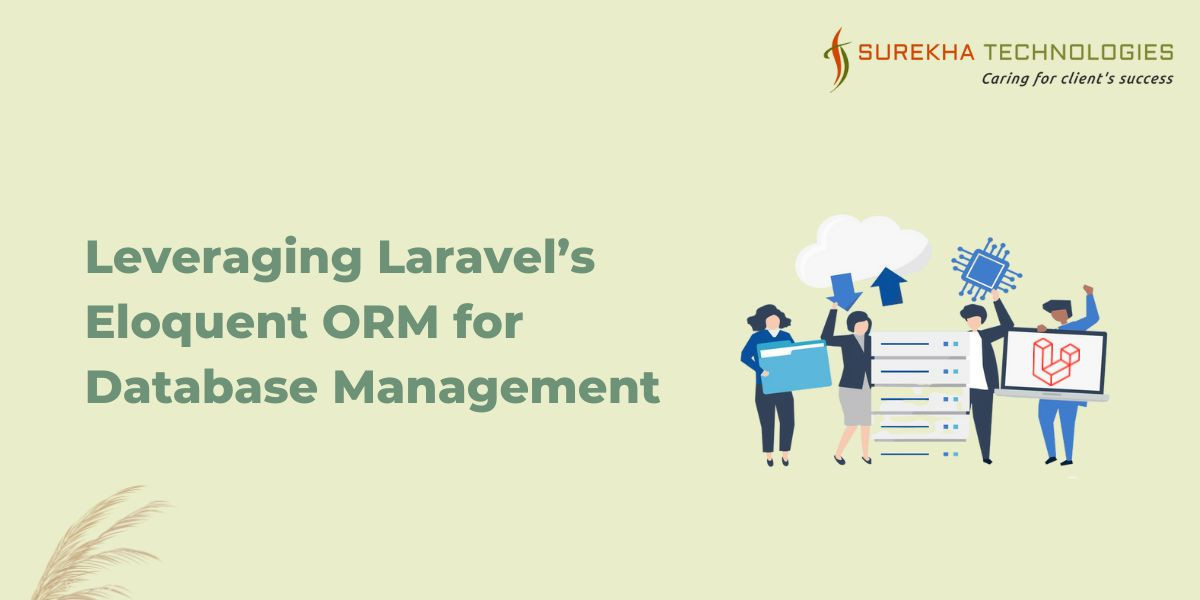Laravel has earned its reputation as one of the most popular PHP frameworks, renowned for its elegant syntax, robust features, and developer-friendly tools. At the heart of Laravel’s database management lies Eloquent ORM (Object-Relational Mapping), a feature that significantly simplifies interaction with databases. Eloquent ORM empowers developers to manage data using a seamless and expressive syntax, making Laravel application development services a preferred choice for businesses looking to create scalable and efficient applications.
What is Eloquent ORM?
Eloquent ORM is Laravel’s default implementation of object-relational mapping, enabling developers to work with databases in a more intuitive and structured way. It abstracts the complexities of SQL queries and allows developers to interact with their database using straightforward PHP syntax. Each database table is associated with a corresponding Eloquent model, and the model serves as a bridge between the database and the application’s logic.
Key Features of Eloquent ORM
Active Record Implementation Eloquent models act as active record, meaning each model instance corresponds to a row in the database table. This allows developers to retrieve, insert, update, and delete records directly through model instances, eliminating the need for complex SQL statements.
Relationships Management Eloquent makes it easy to define relationships between database tables. It supports one-to-one, one-to-many, many-to-many, polymorphic, and many-to-many polymorphic relationships. With these features, managing complex data relationships becomes straightforward and highly readable.
Query Builder Integration While Eloquent provides a higher abstraction layer, it integrates seamlessly with Laravel’s query builder. Developers can switch between raw queries and Eloquent’s expressive syntax as needed, offering unmatched flexibility.
Eager Loading Eloquent supports eager loading, a feature that helps optimize database queries by loading related data upfront. This reduces the number of queries executed, improving the application’s performance and reducing latency.
Mutators and Accessors Mutators and accessors allow developers to transform attributes when retrieving or saving them in the database. This feature enhances data consistency and ensures seamless integration with business logic.
Soft Deletes Soft deletes enable developers to mark records as deleted without actually removing them from the database. This is particularly useful for applications requiring data recovery or audit trails.
Advantages of Using Eloquent ORM
1. Simplicity and Readability: Eloquent’s syntax is intuitive and clean, making it easier for developers to understand and maintain the codebase. This simplicity reduces the learning curve, especially for teams new to Laravel application development services.
2. Rapid Development: Eloquent’s features, such as relationships and eager loading, accelerate the development process by reducing the need for manual SQL queries and repetitive tasks.
3. Scalability: With Eloquent, developers can manage complex database structures and relationships effortlessly. This scalability is crucial for building modern applications with dynamic data requirements.
4. Security: Eloquent includes built-in protections against common vulnerabilities like SQL injection, ensuring robust database interactions.
5. Extensibility: Eloquent’s design allows developers to customize and extend its functionality to meet specific business needs, making it a versatile tool for diverse projects.
Best Practices for Using Eloquent ORM
Define Clear Relationships: Ensure all relationships between models are explicitly defined to avoid confusion and maintain data integrity.
Use Eager Loading Wisely: Utilize eager loading to optimize performance and reduce unnecessary database queries.
Leverage Query Scopes: Use local and global query scopes to encapsulate common query logic, enhancing code reuse and readability.
Optimize Data Access: Avoid over-fetching data by specifying the required fields using the
selectmethod in queries.Enable Soft Deletes Judiciously: Implement soft deletes for tables where data recovery or historical records are essential.
Real-World Applications of Eloquent ORM
Laravel’s Eloquent ORM is widely used across industries to build powerful web applications. From e-commerce platforms managing product inventories to content management systems organizing articles and user data, Eloquent simplifies the database management process. For businesses leveraging Laravel application development services, Eloquent ORM provides a competitive advantage by reducing development time and increasing operational efficiency.
Conclusion
Eloquent ORM is a cornerstone of Laravel’s appeal, offering a seamless way to manage databases while maintaining clean and efficient code. Its powerful features, combined with Laravel’s ecosystem, make it an indispensable tool for developers and businesses alike. By integrating Eloquent ORM into your development workflow, you can streamline database interactions and create robust applications tailored to your specific needs. Embrace Laravel application development services to unlock the full potential of Eloquent ORM and deliver exceptional user experiences.









